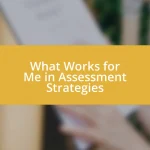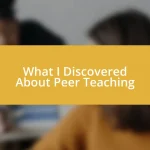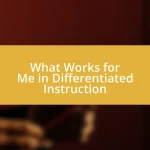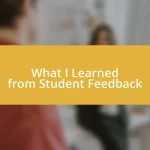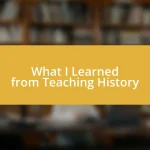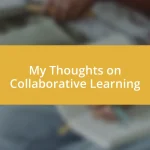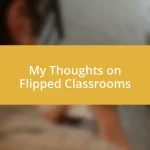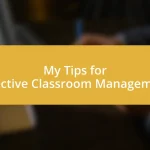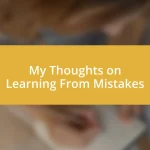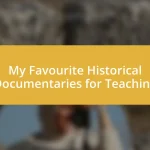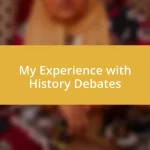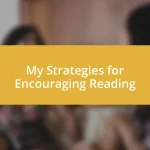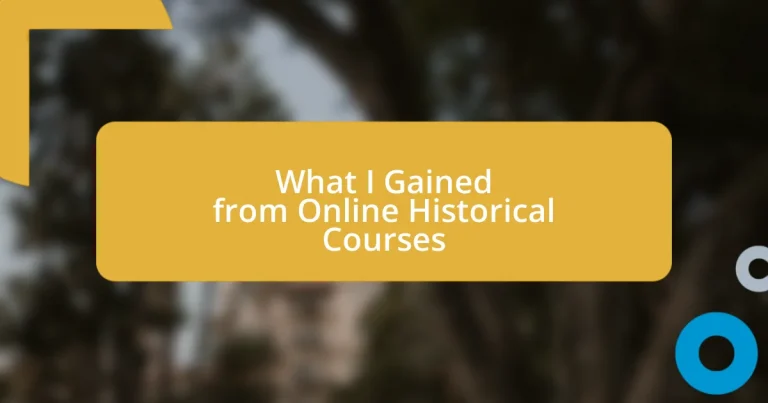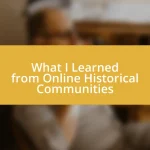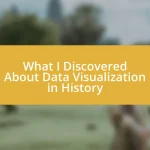Key takeaways:
- Online historical courses offer flexibility, diverse perspectives, and access to rich resources, enhancing personal learning experiences.
- Engagement with history fosters critical thinking, research skills, and empathy, enriching understanding of diverse cultures and promoting effective communication.
- Knowledge of history informs contemporary issues and future opportunities, providing insights that are valuable in personal growth and professional endeavors.
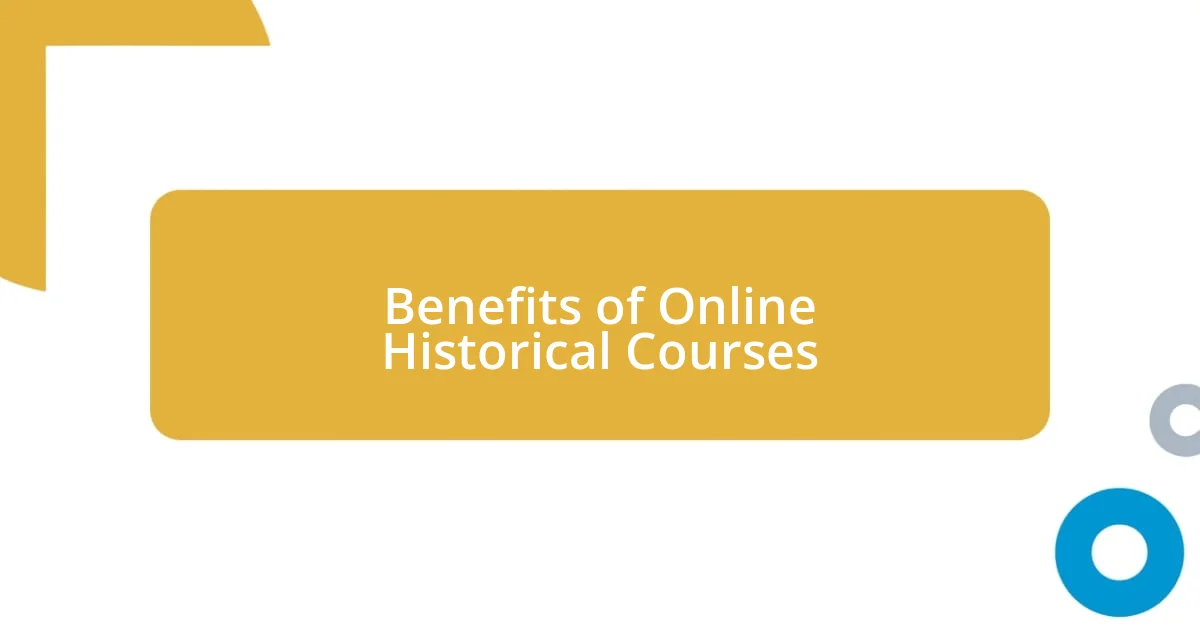
Benefits of Online Historical Courses
One of the standout benefits of online historical courses is the flexibility they offer. I remember when I took a course on Ancient Rome; I could study late at night with a cup of tea in hand, all while diving deep into the intricate world of emperors and gladiators. Isn’t it freeing to learn on your terms, fitting education into your busy life instead of the other way around?
Moreover, these courses often provide access to a wealth of resources that traditional classrooms may lack. I vividly recall watching a fascinating documentary about the French Revolution that complemented my readings perfectly. It turned this abstract concept into a vivid experience. Isn’t it remarkable how multimedia can transform the way we engage with history?
Lastly, the diverse perspectives offered in online formats have enriched my understanding significantly. I often find myself in discussion forums with fellow students from different parts of the globe. Sharing thoughts and interpretations leads to enlightening debates. How else could one have the opportunity to connect with history enthusiasts from across the world, all passionate about the same subject matter?
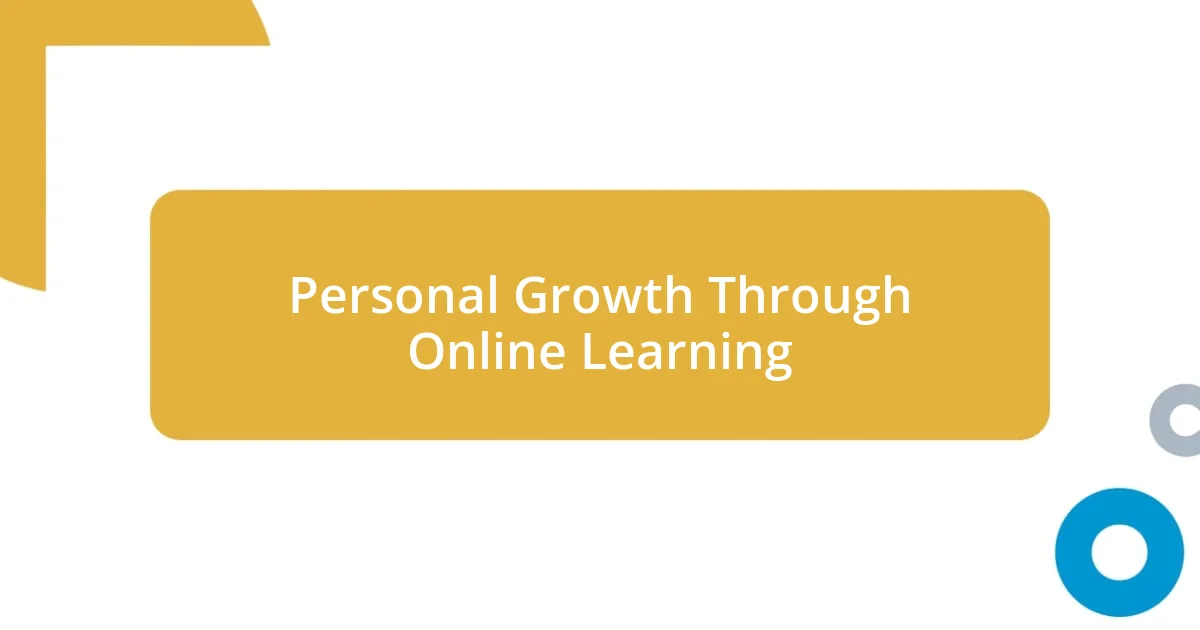
Personal Growth Through Online Learning
Engaging in online historical courses has been a transformative journey for me, fostering growth at a personal level. The experience of navigating complex historical narratives alone allows me to develop critical thinking and self-discipline, skills that spill over into various aspects of my life. For instance, as I unraveled the layers of World War II, I couldn’t help but feel a deeper empathy for those who lived through it. This emotional connection made the past come alive, driving me to explore not just the facts but also the human experiences behind them.
Here are some key gains I’ve experienced through this form of learning:
- Enhanced self-discipline by adhering to study schedules without external pressure.
- Development of critical thinking skills through analyzing varied historical interpretations.
- Increased empathy and understanding of different cultures and experiences.
- Greater confidence in articulating thoughts in discussion forums, fostering communication skills.
- Expansion of my network, connecting with peers who share a passion for history from diverse backgrounds.
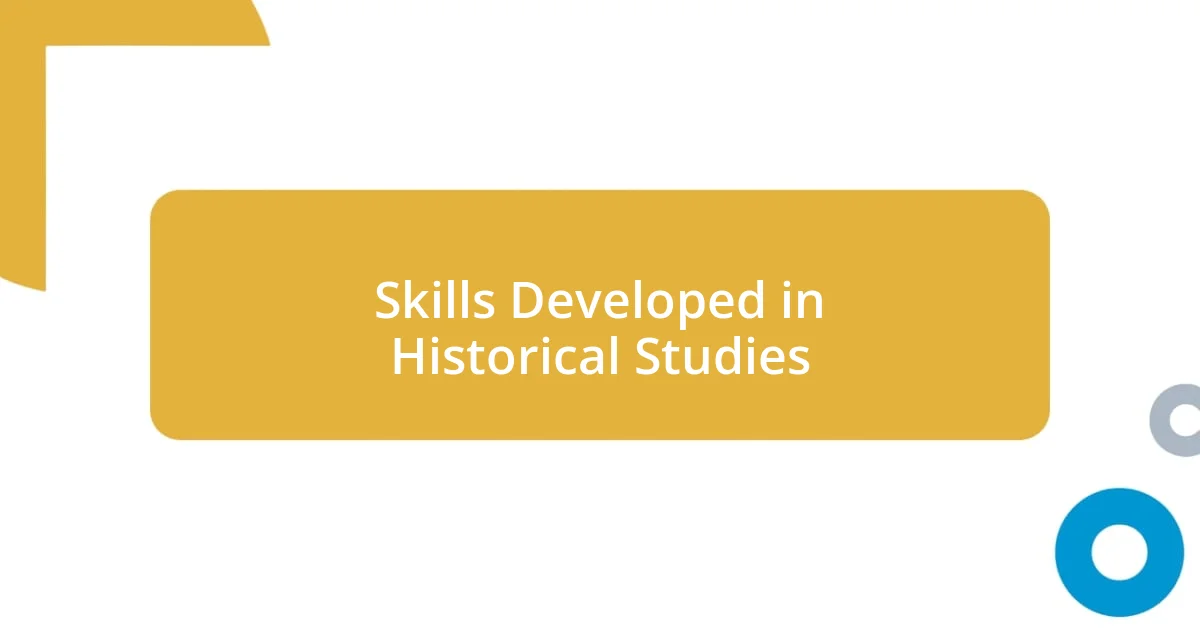
Skills Developed in Historical Studies
Engaging with historical studies has honed my research abilities significantly. Each time I dove into a new topic, whether it was the Industrial Revolution or the Civil Rights Movement, I found myself sifting through countless sources. The thrill of piecing together varied accounts taught me how to discern credible sources from those that are biased or superficial. Have you ever felt that satisfaction when you uncover a rare insight in a sea of information? I certainly have, and it’s a skill that extends far beyond just historical studies.
Moreover, I’ve learned to appreciate the importance of context. History is rarely black and white; it’s a tapestry woven from countless threads of influence and consequence. As I explored different epochs, I found myself able to grasp how past events shape contemporary society. For instance, while studying the effects of colonization, I became aware of its lingering impact on modern geopolitics. This kind of awareness makes discussions about current events much more engaging and meaningful.
Lastly, my communication skills have flourished through the necessity of articulating complex ideas clearly. Whether I was writing essays or participating in online discussions, I had to translate intricate historical arguments into accessible language. I remember sharing my take on a controversial figure from history—crafting my thoughts carefully and ensuring that they resonated with others. It’s incredible how conveying ideas effectively not only boosts confidence but also enhances connection with others who share the same passion.
| Skill Developed | Description |
|---|---|
| Research Skills | Ability to evaluate sources and discern credibility |
| Understanding Context | Grasping the influence of historical events on modern society |
| Communication Skills | Articulating complex ideas in an accessible manner |
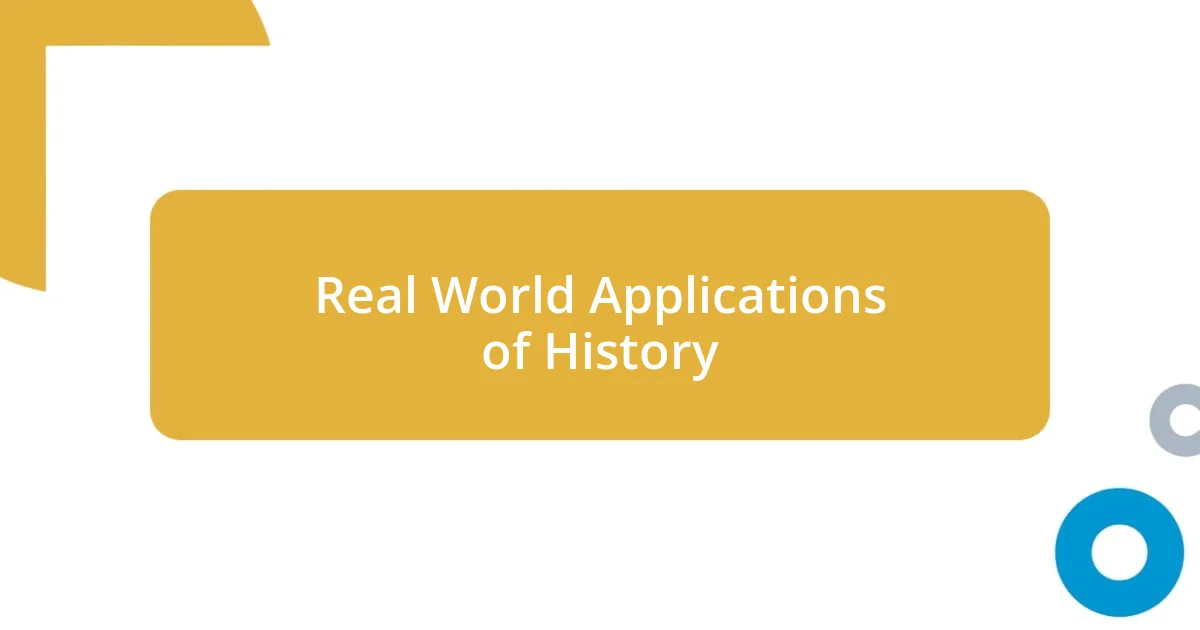
Real World Applications of History
History isn’t just dates and events; it actively informs our world today. For example, when discussing public health policies, I’ve often reflected on how lessons from past pandemics, like the Spanish flu, have shaped current responses. Can you believe that understanding historical viewpoints on vaccine hesitancy can help us navigate similar situations we face now? This connection has not only enriched my conversations with others but has also led me to think critically about the decisions we make today.
One particularly eye-opening moment for me was delving into the civil rights movements. As I studied the strategies employed by activists, I noticed parallels to today’s social justice movements. It made me realize that these historical lessons aren’t just background knowledge; they provide actionable insights for advocating for change today. How cool is it to tap into that deep well of experience? It feels empowering to relate past struggles to the present and even inspires me to engage more actively in my community.
Moreover, history has a profound impact on our cultural identity. While exploring my own heritage, I recognized the importance of understanding my ancestry—where I come from shapes my worldview. This realization fueled my passion for cultural preservation and appreciation. Have you ever thought about how knowing your history enhances your sense of belonging? It’s extraordinary how these historical roots can ground us while simultaneously pushing us to grow and connect with others.
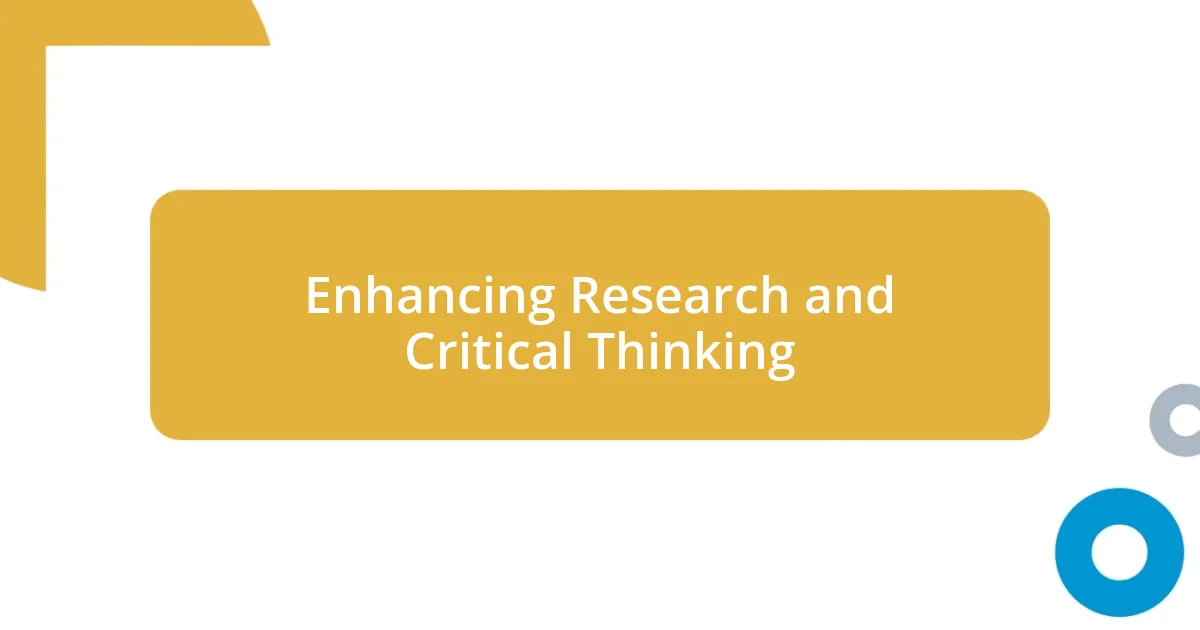
Enhancing Research and Critical Thinking
Engaging in online historical courses has been a transformative experience for my research and critical thinking skills. I remember the first time I encountered conflicting narratives about the same event; I was tasked with dissecting the causes of World War I. The process was challenging but rewarding. I had to evaluate sources meticulously, balancing perspectives from different historians. It was like solving a puzzle, piecing together facts while recognizing which accounts held more weight. Have you ever tried to untangle a complex web of information? The satisfaction of achieving clarity through research is priceless.
As I delved deeper into different historical contexts, I found my analytical skills sharpened immensely. For instance, while studying the causes behind the American Revolution, I didn’t just skim the surface—I analyzed economic, social, and political factors at play. This comprehensive approach opened my eyes to how various elements interact, deepening my understanding. It felt invigorating to recognize that history isn’t simply a sequence of events, but a web of interconnected ideas and consequences. This has pushed me to adopt a more holistic view, not just in history but in my daily life. How has your understanding of interconnectedness shaped your thinking?
Moreover, these courses have cultivated a mindset of questioning and critique in me. Each assignment urged me to ask “why” and “how” rather than just accepting information at face value. I recall a heated debate in one online forum about historical interpretations of colonization. Engaging in this dialogue compelled me to defend my viewpoint with well-researched evidence. It felt electrifying to challenge established narratives while being respectful of differing opinions. I believe that fostering this critical lens allows us to navigate modern issues more thoughtfully. Don’t you think that being able to question assumptions can lead to deeper insights in any field?
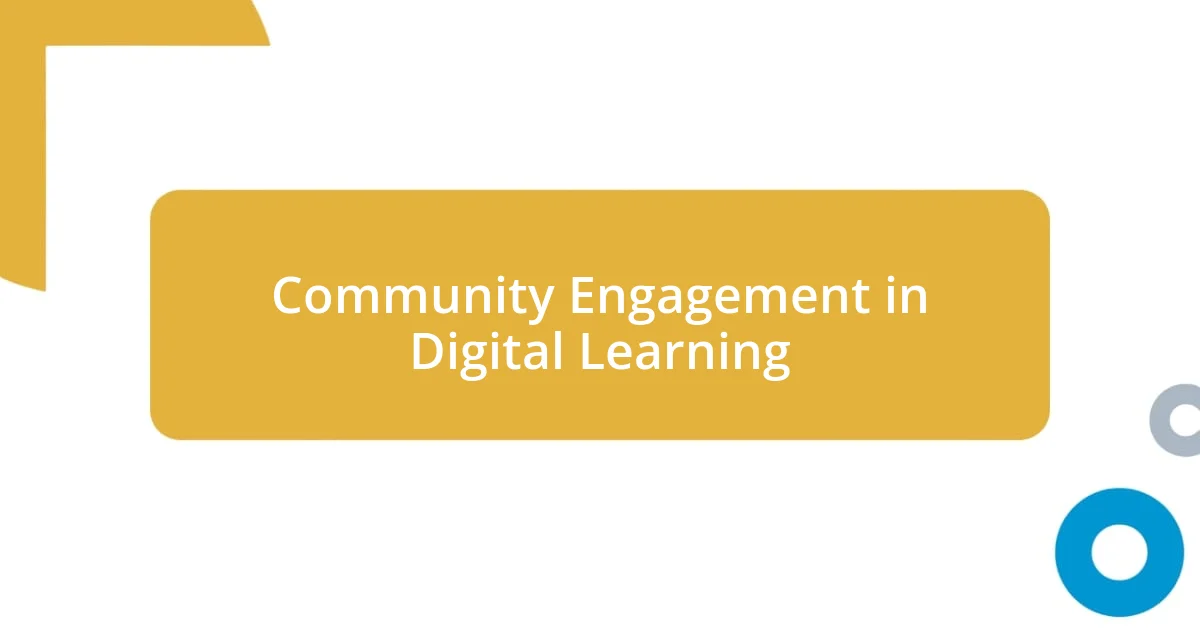
Community Engagement in Digital Learning
Participating in online historical courses has opened up numerous avenues for community engagement that I hadn’t considered before. I recall joining a virtual discussion group that focused on local historical events. It felt like diving into a treasure chest of perspectives as I exchanged ideas with others who shared my passion for history. Have you ever experienced that thrill of connection when discussing a topic you’re passionate about? It’s a unique feeling that reinforces the power of community.
I also discovered the importance of collaboration in digital learning environments. There was a group project I was involved in, analyzing the impact of a significant event in our area’s history. Sharing my findings while taking in insights from others created a rich tapestry of knowledge. It made me realize that history truly comes alive when we learn together, drawing on each other’s strengths and narratives. Isn’t it fascinating how everyone’s perspective can add layers to our understanding of the past?
Moreover, online courses provide a platform to engage with diverse voices and experiences. I remember being moved by someone who shared their family story linked to a historical event we studied. It struck a chord, reminding me that history is personal and deeply rooted in our lives. Realizing that these connections foster empathy and understanding among participants inspired me to reach out further and build relationships beyond our discussions. How does it feel to know that history can be a bridge connecting us within our communities? It’s thrilling to see how digital learning can transform not just our understanding, but our interactions with others, cultivating a supportive learning environment.
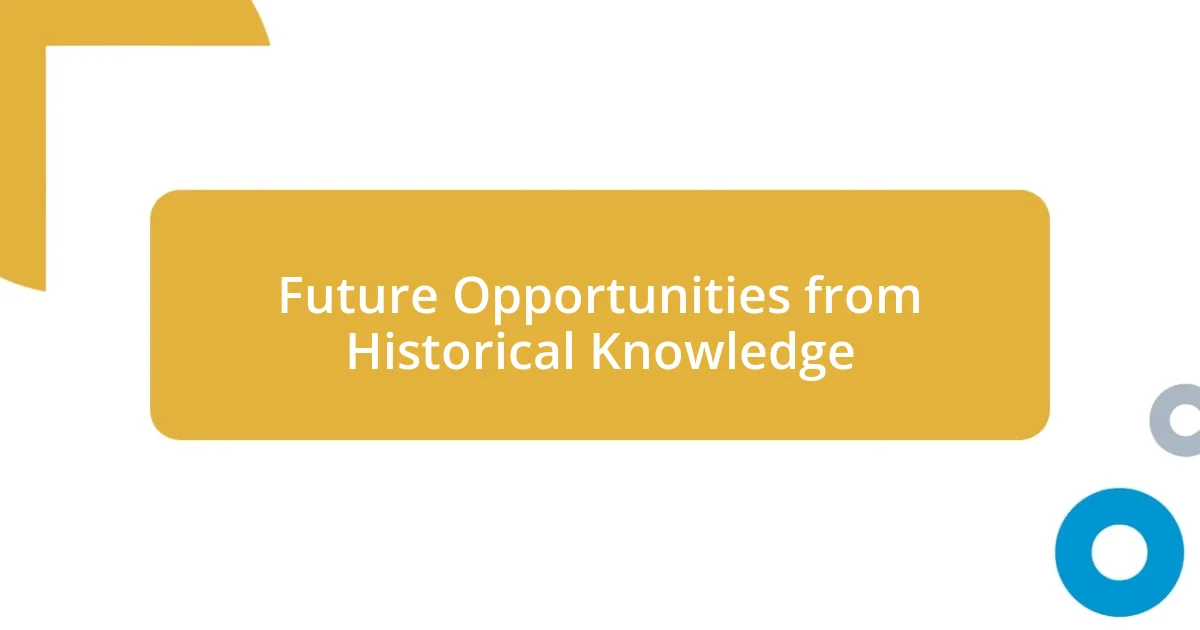
Future Opportunities from Historical Knowledge
Utilizing historical knowledge presents exciting future opportunities that can enhance both personal and professional paths. For me, the ability to draw parallels between past events and current challenges has been invaluable. I often find myself thinking, “How did leaders navigate similar crises in history?” This mindset not only enriches my understanding but also aids in making informed decisions in my own life and career.
As I explored the nuances of different historical periods, I uncovered the value of cultural literacy. I recall a moment during a course where we discussed the Renaissance and its ripple effects on modern innovation. It struck me how understanding this cultural shift not only helps with appreciation for art and literature but also offers insights into contemporary thinking. This kind of knowledge can set one apart in fields like marketing or education, where context shapes communication strategies. Have you considered how historical perspectives could influence your professional endeavors?
Moreover, the path of historical inquiry equips me with transferable skills that are applicable across various sectors. The research techniques I honed in my studies can directly benefit careers in law, journalism, or even public policy. Recently, I attended a networking event where a fellow participant shared how a deep understanding of past legislation informed their work in advocacy. Hearing this made me realize just how crucial our historical insights can be in shaping future outcomes. Isn’t it fascinating how knowledge of history can unlock doors to so many possibilities in our lives ahead?
